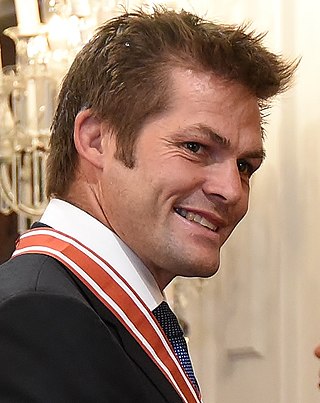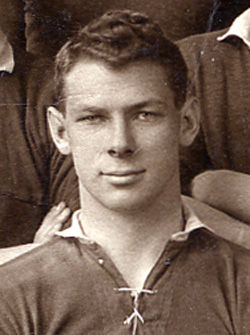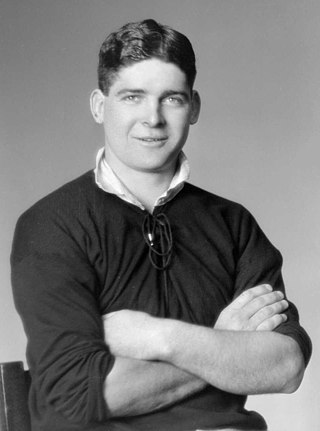
The New Zealand national rugby union team, commonly known as the All Blacks, represents New Zealand in men's international rugby union, which is considered the country's national sport. Famed for their international success, the All Blacks have often been regarded as one of the most successful sports teams in history.

New Zealand Rugby (NZR) is the governing body of rugby union in New Zealand. It was founded in 1892 as the New Zealand Rugby Football Union (NZRFU), 12 years after the first provincial unions in New Zealand. In 1949 it became an affiliate to the International Rugby Football Board, now known as World Rugby, the governing body of rugby union for the world. It dropped the word "Football" from its name in 2006. The brand name New Zealand Rugby was adopted in 2013. Officially, it is an incorporated society with the name New Zealand Rugby Union Incorporated.

Richard Hugh McCaw is a retired New Zealand professional rugby union player. He captained the New Zealand national team, the All Blacks, in 110 out of his 148 test matches, and won two Rugby World Cups. He has won the World Rugby Player of the Year award a joint record three times and was the most capped test rugby player of all time from August 2015 to October 2020. McCaw was awarded World Rugby player of the decade (2011–2020) in 2021. McCaw is also a winner of the New Zealand sportsman of the decade award.

Robert Charles Stuart was a New Zealand rugby union player and administrator. He was given a lifetime service award by the International Rugby Board immediately after the 2003 Rugby World Cup.

Sir Frederick Richard Allen was a captain and coach of the All Blacks, New Zealand's national rugby union team. The All Blacks won all 14 of the test matches they played under his coaching.
Charles Kesteven Saxton was a New Zealand rugby union and cricket player, coach and administrator.

Geoffrey Thomas Alley was a New Zealand rugby union player and librarian. He played three test matches for the All Blacks and was New Zealand's first national librarian.
James Charles Kearney was a New Zealand international rugby union player. He was a member of the All Blacks in 1947 and 1949, playing in the First five-eighth position.

Brigadier James Thomas Burrows was a New Zealand teacher, sportsman, administrator, and military leader.
Walter Garland Argus was a New Zealand rugby union player who played 10 matches including four tests for the national team. From 16 November 2012 until his death he was the oldest living All Black.

Anthony Ian "Beau" Cottrell was a New Zealand rugby union player. A hooker and prop, Cottrell represented Canterbury at a provincial level and was a member of the New Zealand national side, the All Blacks, from 1929 to 1932. He played 22 matches for the All Blacks including 11 internationals. He went on to serve as a member of the management committee of the Canterbury Rugby Union.
Thomas Clarence Morrison was a New Zealand rugby union player and administrator. A wing three-quarter, Morrison represented South Canterbury and Wellington at a provincial level. He was a member of the New Zealand national side, the All Blacks, on their 1938 tour of Australia, playing in five matches including three internationals. He later served on the executive of the New Zealand Rugby Union from 1946 to 1968, and was its chairman between 1962 and 1968. He was also a national selector between 1950 and 1956.
Neville Henry Thornton was a New Zealand rugby union player. A number eight, Thornton represented King Country and Auckland at a provincial level, and was a member of the New Zealand national side, the All Blacks, in 1947 and 1949. He played 19 matches for the All Blacks including three internationals.
Augustine Patrick Spillane was a New Zealand rugby union player. Gus Spillane came from a Temuka rugby family of Irish descent and one steeped in rugby. Three of his brothers also represented South Canterbury with one, Charles, later moving to Wanganui and Taranaki and becoming prominent in refereeing and administration. The Spillane Cup, the traditional trophy competed for at Easter by North Island Marist clubs, is named after Charles Spillane. Primarily a tidyfirst five-eighth, Spillane represented South Canterbury at a provincial level, and was a member of the New Zealand national side, the All Blacks, in 1913. He appeared in two matches for the All Blacks, both of them internationals against the touring Australian team, in which he played at second-five eighth.
James Douglas Mackay was a New Zealand rugby union player. A wing three-quarter, Mackay represented Wellington at a provincial level, and was a member of the New Zealand national side, the All Blacks, in 1928. He played two matches for the All Blacks, scoring four tries, but did not appear in any internationals.
Trevor Berghan was a New Zealand rugby union player. A first five-eighth, Berghan represented Otago at a provincial level, and was a member of the New Zealand national side, the All Blacks, on their 1938 tour of Australia. He played six matches for the All Blacks on that tour, including three internationals.
John George Rankin was a New Zealand rugby union player. A flanker, Rankin represented Canterbury and, briefly, Wellington at a provincial level. He was a member of the New Zealand national side, the All Blacks, in 1936 and 1937. He played four matches for the All Blacks including three internationals.

Jack Finlay was a New Zealand rugby union player. A versatile player, Finlay turned out in the forwards for his club but usually as a first or second five eighth at provincial level for Manawatu. He played just one match for the New Zealand national side, the All Blacks, as a Number 8 in the first test against the touring Australian team at Carisbrook in 1946, in which he scored a try.
Maurice Patrick Goddard was a New Zealand rugby union player. A centre three-quarter, Goddard represented Ashburton County and South Canterbury at a provincial level, and was a member of the New Zealand national side, the All Blacks, from 1946 to 1949. He played 20 matches for the All Blacks including five internationals, scoring nine tries in all.
Lachlan Ashwell Grant was a New Zealand rugby union player. Born in Temuka, Grant is regarded as that town's finest rugby product. A flanker and lock, Booth represented South Canterbury at a provincial level, and was a member of the New Zealand national side, the All Blacks, from 1947 to 1951. He played 23 matches for the All Blacks including four internationals, and captained the team in two matches during the 1951 tour of Australia.









